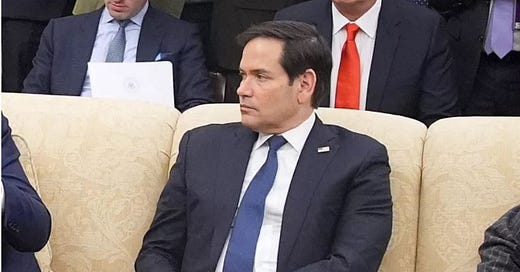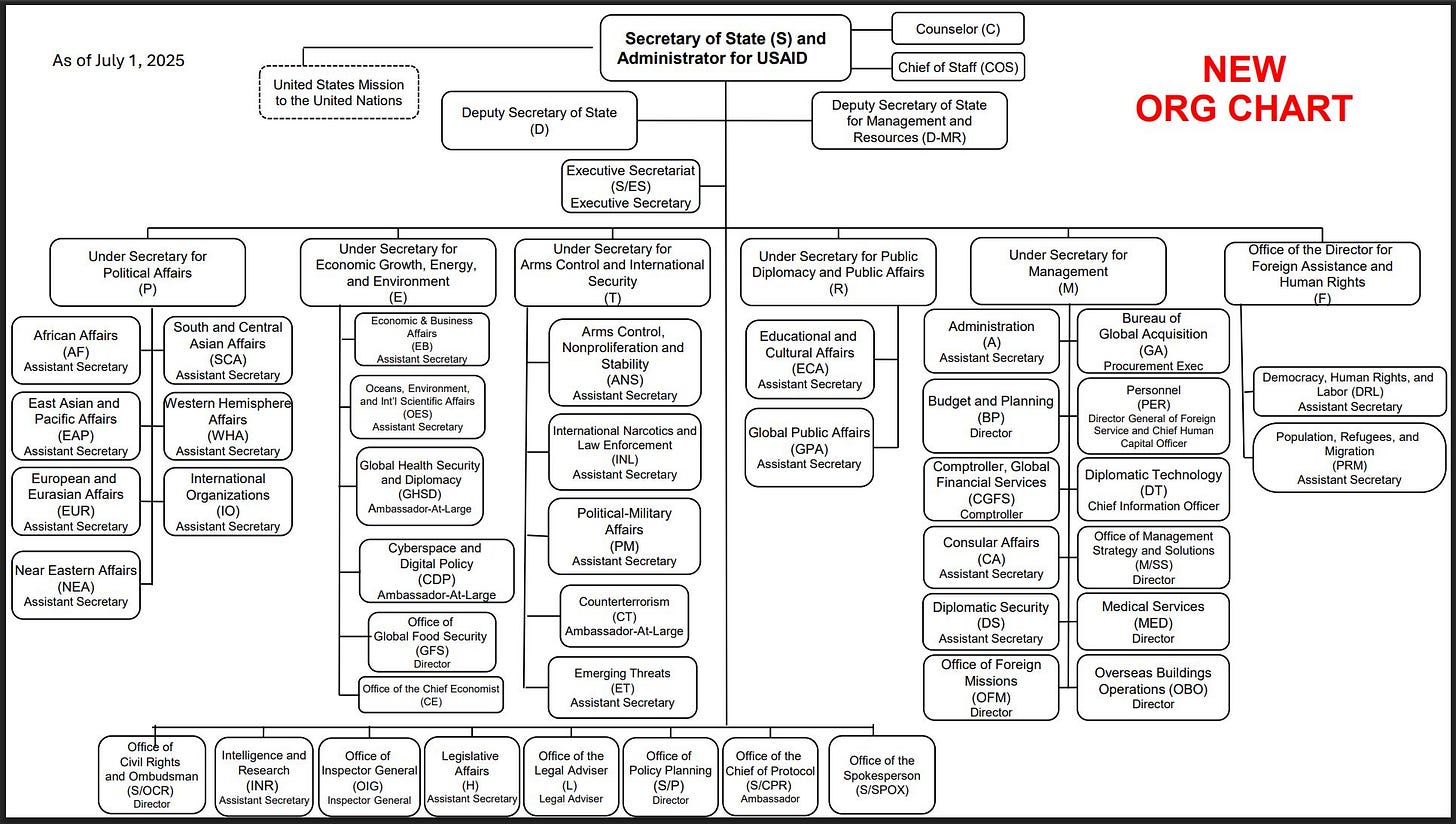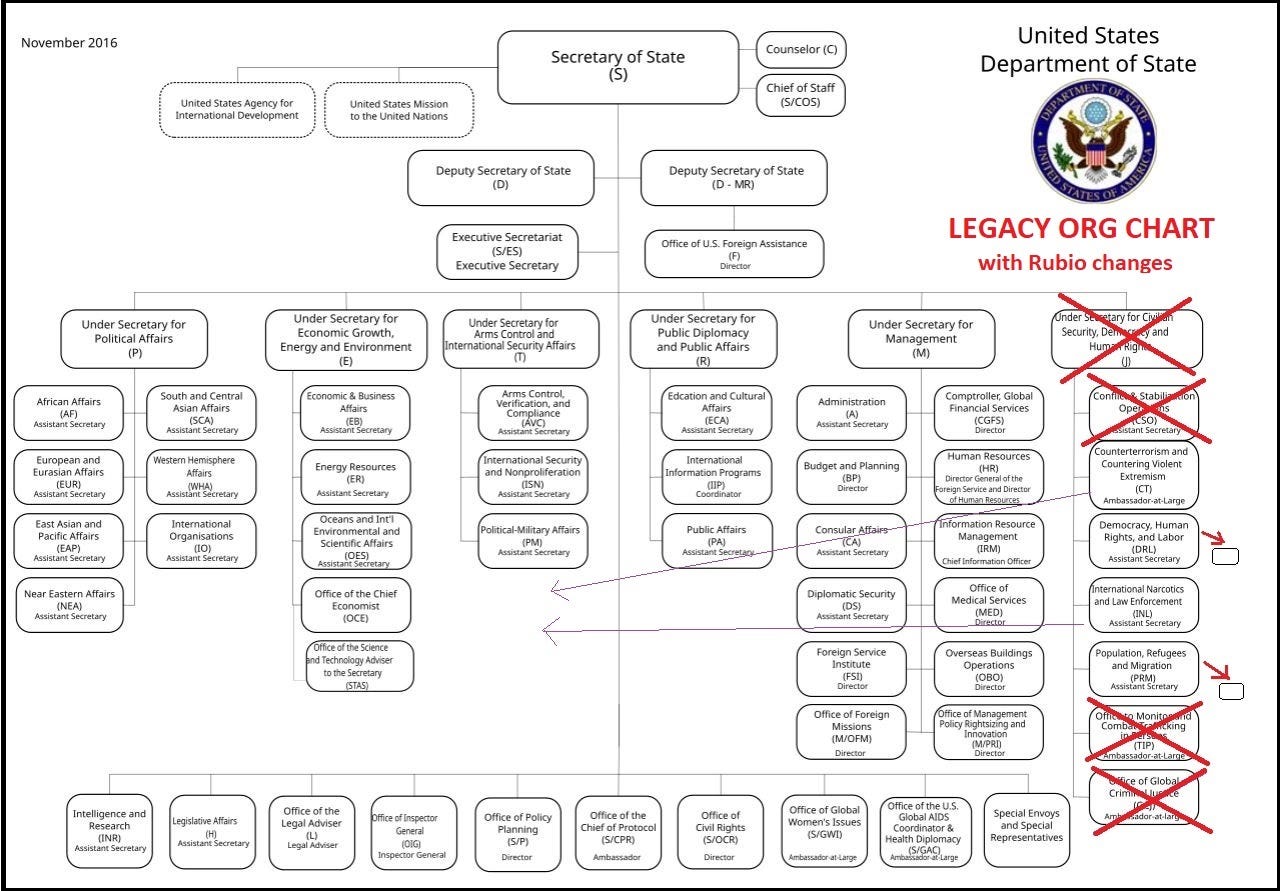Secretary Rubio is institutionally demoting human rights
By closing and demoting “functional” bureaus, he is diminishing the space for human rights in foreign policy-making
In a recent interview, Secretary of State Marco Rubio made his clearest case yet how his reorganization of the State Department will de-prioritize human rights, by subsuming such considerations within the bureaus that historically and innately prioritize bilateral relations over human rights.
Bureaucracy is policy. An organizational chart has a big impact on how policy is made. Which offices draft memos and which offices have to clear them determine how the information and arguments are organized, and thus influence what decision-makers decide.
Secretary Rubio’s org chart sidelines, if not eliminates, the human rights perspective:
For decades, the State Department has had two sides: “regional” bureaus and “functional” bureaus. The regionals (Western Hemisphere, East Asia and the Pacific, etc.) handle bilateral relations with the governments in their regions. Collectively, these bureaus report to the Under Secretary for Political Affairs (P). (Emphasis mine, because this is important.)
The functional bureaus (Democracy, Human Rights and Labor (DRL); Population, Refugees and Migration (PRM), etc.) manage cross-cutting issues and the “values” issues that the foreign government interlocutors of the regional bureaus don’t want the U.S. government to pay attention to (such as how they repress their citizens). They report to the Under Secretary for Civilian Security, Democracy and Human Rights (J), at the same level as P. This is how it has looked (and how Rubio changes it):
The functionals exist for this very reason. Congress and State Department leaders created these bureaus in order to ensure that issues like human rights, human trafficking, refugees, atrocities prevention, conflict prevention, democracy and rule of law were critical elements of how the United States relates to people in other countries, reflect core American values and universal values expressed through the Universal Declaration of Human Rights.
The regional/functional structure represents a check-and-balance system in the State Department. It ensures that both political matters and “values” issues get an airing in the policy-making process.
Rubio is eliminating this check-and-balance system. He is explicit this is his aim: “These two have to be brought together,” as he said in the interview. He correctly acknowledges that U.S. policy tries to balance “geopolitical considerations” with “idealism.” But through his reorganization -- “a group of people that care about human rights, but we’re putting those people in the regions and in the embassies so that all of our foreign policy is being balanced within those bureaus” – he will achieve the opposite.
The “within” means that the human rights people will report up to the regional assistant secretaries who report to the Under Secretary for Political Affairs – officials whose job by definition prioritizes relations over “values.” This is a recipe for sweeping human rights under the rug.
This is not just my opinion. Ask anyone who has worked in or with the State Department. That the regionals will bury human rights concerns is as close to an organizational fact as you can have. It’s the reason that DRL was created in 1977, PRM in 1979, the Office of Global Criminal Justice in 1997, the Office of Trafficking in Persons in 2001: to provide the balance that did not exist before. History tells us that Rubio is lying in his claim that his plan to eliminate or downgrade these offices restores “balance.”
In the interview, Rubio refers to the cumbersome clearance process for memos (from my time at State, I can vouch that he has a point). But rather than streamline the process, he says “the way to do it is to get rid of all of these offices that are all chiming in, any one of whom could slow action for an indefinite period of time.” The offices he wants to get rid of are the human rights ones.
Take an example of a decision memo on providing military assistance to country Z. The regional bureau supports the aid since it will make country Z’s leaders more favorable to U.S. priorities in the region. But the functional bureaus warn that such assistance will make the U.S. complicit in human rights abuses in country Z, as its government has a record of using its military to kill its own citizens. The functionals argue that providing this aid will worsen the reputation of the U.S. in country Z and the region.
In the legacy structure, these competing priorities would be hashed out between the bureaus, with a decision memo presented to the Secretary that explains the trade-offs (or even done as a “split memo” with differing recommendations from the two sides).
But Rubio’s system gives all power to the regional side because it subordinates the human rights staffers under the political affairs offices. The only officials given the opportunity to sign off are the regional Assistant Secretaries because the Assistant Secretaries who handle human rights equities are being eliminated. There is no one at the table in Secretary Rubio’s senior staff meeting to offer an alternative view to the Under Secretary for Political Affairs’ recommendation to provide the military assistance to country Z, because Rubio is deleting the position of Under Secretary for Civilian Security, Democracy and Human Rights.
Rubio’s elimination of the check-and-balance system within the Department gives all power to the political affairs side and disempowers the human rights side under the false claim this promotes “balance.”
There are other ways Rubio is diminishing human rights within the institution. He is shrinking the Department’s annual Country Reports on Human Rights Practices by ending reporting on many topics, such as denial of freedom of movement and peaceful assembly, lack of due process for political prisoners, restrictions on "free and fair elections,” rights of indigenous peoples, those with disabilities and LGBTQ persons. Combined with the plan to eliminate many embassies and consulates, and reducing the size of the foreign service, there will be fewer human and policy resources available to cover human rights.
One of the huge understated benefits of the Country Reports is how it institutionalizes human rights in the system. The first draft of a report on a country is done by a political officer at an embassy or consulate. In order to perform that function, the political officer is assigned the responsibility to meet with human rights advocates and monitor developments in that country. Thus, each embassy is required to have at least one human rights officer. This structure gives that foreign service officer experience in human rights principles and engagement, which they carry with them throughout their career.
Rubio’s reforms undermine this system. By cutting down the annual report and cutting back embassies, there is less need and incentive for foreign service officers to gain professional experience on human rights. By eliminating or reducing functional bureaus, there are fewer rotations for these officers to gain policy-making experience on human rights.
Marco Rubio built his brand in the Senate by portraying himself as a champion for human rights, especially in China, Cuba and Venezuela. This was not a hollow effort; he introduced hundreds of bills with human rights dimensions. He served on the Senate Foreign Relations Committee and chaired the Congressional-Executive Commission on China. Rubio knows the system and the structure. He knows that his actions will diminish the role of human rights in policy-making. It is a conscious and intentional choice he is making.





